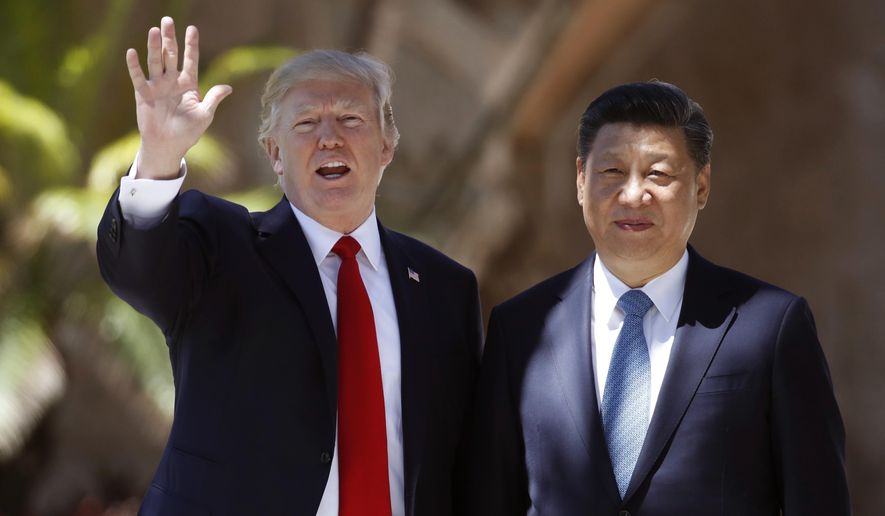As the drumbeats for war with North Korea grow louder, it’s time to imagine a peaceful solution to the crisis that would appeal to the author of “The Art of the Deal.” There’s room for a bargain with China in which it would effectively police its client state, in return for American give-ups that we’d be better off without.
President Trump should acquiesce in a Chinese sphere of influence in Asia that corresponds to our sphere of influence in South and Central America and in the Caribbean — de facto protectorates that have endured and expanded for two centuries under the Monroe Doctrine. Among other things, acquiescence would mean removing our tens of thousands of troops from South Korea and Japan; revoking our defense treaties with them and the Philippines as we did with Taiwan in 1979, without igniting a Chinese invasion; and ending the United States naval presence in the South China Sea. It is to China what the Caribbean Sea or the Gulf of Mexico is to the United States.
In exchange, Mr. Trump should demand that China force North Korea to destroy and renounce weapons of mass destruction — including its nuclear arsenal and capabilities — through annexation of North Korea or otherwise. The president should require verification of the destruction through onsite inspections by U.S. experts.
Cutting the North Korean Gordian knot in this manner would honor Mr. Trump’s certain trumpet that he was elected president of the United States to protect the American people from actual aggression. He himself had noted that he was not elected president of the world to protect foreigners with no allegiance to the United States from intestinal convulsions, tyranny or warfare thousands of miles from our borders.
Ending the United States current gendarme role for all Asia will provide Mr. Trump with the financial resources for a policy of invincible self-defense, including pay raises for soldiers who would be defending Americans in the United States, not foreigners dwelling in foreign lands and clueless about the “Battle Hymn of the Republic.”
China has no enthusiasm for North Korea’s nuclear ambitions. But it has even less enthusiasm for the United States pivot to Asia and attempt to encircle China and block the normal sphere of influence great powers expect. Among other things, the United States is building an advanced missile defense system in South Korea; multiplied military training bases in the Philippines; supported Vietnam in its maritime disputes with China; established a Marine base in Darwin Australia; pledged to defend with military force Japan’s disputed claim to the Senkaku Islands; and threatened to prevent China from visiting its artificial islands in the South China Sea.
While the United States routinely patrols those waters with the multi-billion dollar aircraft carrier USS Carl Vinson, China has never deployed its one primitive aircraft carrier built from a hull bought from Ukraine anywhere near the United States. China reluctantly supports North Korea’s nuclear brinkmanship because it distracts the United States from containing China’s South China Sea ambitions.
China would come to North Korea’s defense if the Kim Jong-un regime were attacked by the United States as it came to Kim Jong-il’s defense during the 1950-1953 Korean War. China does not want North and South Korea united in the manner of East and West Germany after the fall of the Berlin Wall. Reunification would mean U.S. troops and bases along the Yalu River border with China, which proved a casus belli in the Korean conflict.
The timeworn arguments by the multi-trillion dollar military-industrial complex for a muscular U.S. military presence throughout Asia are unconvincing. It is not necessary to prevent China from conquering its neighbors. Then-President Jimmy Carter revoked the Taiwan Defense Treaty in 1979. China has neither attacked nor otherwise impaired Taiwan’s sovereignty during the ensuing 38 years.
Japan can easily defend itself from Chinese aggression with its huge self-defense arsenal permitted under the no-war provisions of Article 9 of the Japanese Constitution. Indeed, China has more to fear from Japanese aggression than vice versa if it were to repeal Article 9. Japan defeated China in the 1894-95 Sino-Japanese War for dominant influence in Korea; and Japan invaded Manchuria in 1931 as a dress rehearsal for a full-scale invasion of China in 1937 following the Marco Polo Bridge incident.
South Korea is also fully capable of self-defense against Chinese aggression. It is vastly wealthier and more politically unified than in 1950 when the Korean War erupted under the corrupt and dictatorial President Syngman Rhee. China’s military is far from invincible. It was smartly defeated by puny Vietnam in 1979 despite an overwhelming numerical military advantage.
The United States would continue to protect freedom of navigation in the South China Sea, which the Chinese have never obstructed.
Depend upon it. The proposed negotiation with China to extinguish North Korea’s nuclear arsenal and ambitions at no cost to the United States will earn Mr. Trump thunderous popular applause from the only people he represents: U.S. citizens.
Bruce Fein was associate deputy attorney general and general counsel of the Federal Communications Commission under President Reagan, and is the author of “American Empire Before The Fall.”




Please read our comment policy before commenting.